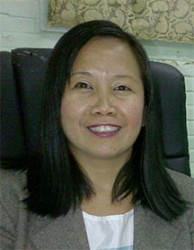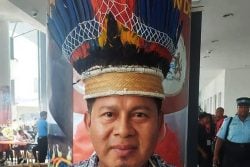By Jeff Trotman
Janette Campbell is a national of the Philippines, but she professes to have found her purpose in life in Guyana through the Alternative Learning System (ALS) – a professional development institution, known for its expertise in teaching and mentoring children in Linden, particularly children with special needs.
She arrived in Guyana in 2007 as an international consultant to the Ministry of Education in relation to designing systems for children with learning disabilities and special needs. “Coming and living in Guyana is not an accident,” Campbell told Stabroek News as she highlighted a successful summer programme that ALS conducted this year.
Emphasizing that one has to have a passion to work with children to be a successful teacher, especially with children with learning disabilities, Campbell added that God has a big hand in her life: “God planned where I was born and where I live. My race and nationality are no accident. God left no detail to chance. He planned it all for his purpose. The Bible says from one man, he made every nation and he determines the time set for them and the exact place where they should live. So, my nationality and why I’m here in Guyana are no accident. Nothing in my life is arbitrary. It’s all for a purpose.”

Campbell holds a bachelor’s degree in English and a Masters of Arts in Education, Language and Literacy from the Open University of the Philippines. She has professional training in family and youth advocacy and identification and treatment of child abuse. She called on her vast experience, which includes sixteen plus years in teaching, community and social work to establish ALS in 2011 with the aim of having children, youth and adults obtain quality education, security and care so that they can develop and tap their full potential.
She said that since she came to the country as a consultant specialist in early child education under the aegis of an international agency, she is aware of the long term and short term decisions that affect children’s education that have been made at all levels of the education system with inputs from ordinary teachers right through to the highest level in the Education Ministry.
Impressed by the efforts of the current Minister of Education, Campbell says she has seen a definite overall lift in education across the country. Pointing out that language and culture are responsible for the growth and development of children, Campbell says that for the past six years, she has held deep concern for the education of young children in Guyana and she has placed much emphasis on remedial reading amongst young people and children.
Noting that many teachers use creolese instead of Standard English as the medium of instruction in the class room, Campbell, said that she has encountered difficulty working with children in the classroom.
Problems
According to her, many Guyanese children would encounter problems when they leave the country because they are deficient in reading and language skills. Pointing out that she is not only a reading specialist, Campbell said she is also trained in early childhood education and social work, which include being able to identify children, who are abused in various forms. She added that some children do not perform well in school because they have disruptive behaviour problems, attentional problems and phonological processing problems.
“They are troublesome and have disturbing emotions,” Campbell elaborated. “We don’t know if the child is abused sexually, or abandoned at home, or, at school. So, I have to address that issue before I can address the learning problem.”
She said, apart from disruptive behaviour problems, children who have learning difficulty, tend to suffer from attention disorder. According to her, most children, who enroll in the ALS programme, come from single-parent homes. “A child growing up without a father figure at home would tend to find love outside of the home.”
Campbell said a third issue, which is very common in Guyanese children, relates to students with specific phonological processing problem. “It has to do with phonemic awareness,” she explained. “If you fail phonemic awareness then you’ll fail in reading.”
Abuse
Noting that teenage pregnancy is increasing in Guyana, Campbell believes “one cannot expect a child to properly mother a child” especially when that mother is a single parent.
She also feels that teachers should be open to new ideas and when in doubt about the value of decision, parents and teachers should put the child’s welfare first.
She explained that difficult circumstances would describe children, who are facing abuse in various forms, including sexual, physical, abandonment and neglect.
“For the past four years, I have been able to identify four children, who have been abused physically and sexually. Others have been abandoned and neglected,” Campbell disclosed, adding that she has reported the incidents to the relevant authorities, resulting in “in two of them being housed in one of the shelters in Georgetown”.
Summer programme
ALS‘ recent six-week summer programme, held from July 22 to 30 August, in Linden, was aimed at enhancing the physical, social, emotional, intellectual, psychological, spiritual and language development of children between four and fifteen years of age.
“Learning is fun” was the theme of the programme, which covered sixty hours and included specialized classes in reading; a basic course in one of the following foreign languages: Chinese, Dutch, and Portuguese; a field trip; arts and craft; theatre arts; and personality development.
Thirty seven children participated in the field trip, which covered the Dakoura Creek Watershed, Guyana Water Inc’s water treatment facilities in Linden and waste disposal facilities, operated by the Linden IMC. The field trip was aimed at enlightening the students on the importance of keeping their environment clean.
Reading and Language Skills was one of the five areas covered during the programme.
This topic covered the five competency skills – phonemic awareness, the ability to manipulate sounds in words; phonics – understanding the difference between sounds and letters; vocabulary; comprehension and fluency.
Campbell said from her experience she has found that when Guyanese children are shown letters they make sounds instead of calling the letter.
In this regard, she said that in teaching children to read and to pronounce words, consideration must be made for the culture in which the child is being brought up.
She said at the end of the six week programme, the children were able to engage in basic communication in the respective languages such as introducing themselves, counting and identifying colours, etc.
Appreciation
In expressing appreciation for the generous sponsorship that the programme received, Campbell said forty two children – 26 boys and 16 girls – were able to benefit from the 37 sponsors with Jacobs Tax Services of New York sponsoring eight students on the summer programme.
She also expressed gratitude to the Church of Jesus Christ of Latter Day Saints, which provided the venue for classes to be conducted.
She also mentioned students from the Jamaica based Northern Caribbean University, who were on a field tour of Guyana and helped with assessing students for enrollment on the ALS summer programme.
Other sponsors included: attorney Gordon Gilhuys; Republic Bank, Linden Branch; Linden Enterprise Network (LEN); Guyana Book Foundation; Food for the Poor; and the Linden Fund Trust.




